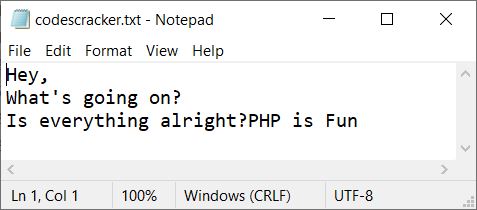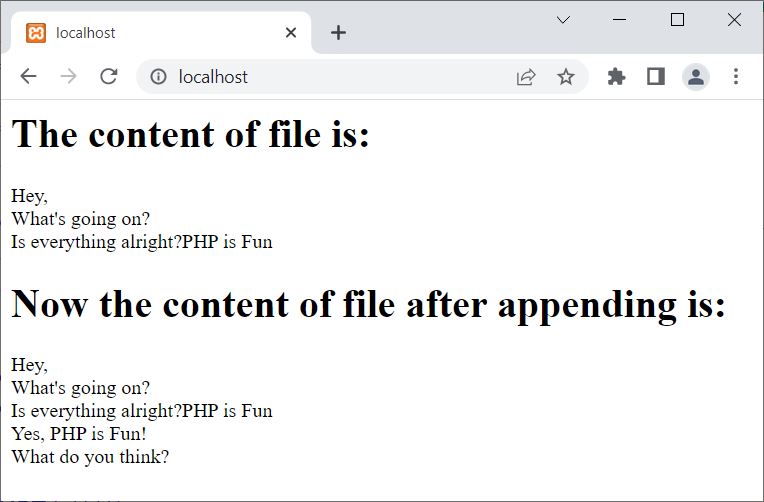- PHP Basics
- Learn PHP
- PHP Comments
- PHP Data Types
- PHP Variables
- PHP Operators
- PHP echo
- PHP print
- PHP echo vs. print
- PHP if else
- PHP switch
- PHP for Loop
- PHP while Loop
- PHP do...while Loop
- PHP foreach Loop
- PHP break and continue
- PHP exit()
- PHP exit() vs. break
- PHP isset()
- PHP Arrays
- PHP print_r()
- PHP unset()
- PHP Strings
- PHP Functions
- PHP File Handling
- PHP File Handling
- PHP Open File
- PHP Create a File
- PHP Write to File
- PHP Read File
- PHP feof()
- PHP fgetc()
- PHP fgets()
- PHP Close File
- PHP Delete File
- PHP Append to File
- PHP Copy File
- PHP file_get_contents()
- PHP file_put_contents()
- PHP file_exists()
- PHP filesize()
- PHP Rename File
- PHP fseek()
- PHP ftell()
- PHP rewind()
- PHP disk_free_space()
- PHP disk_total_space()
- PHP Create Directory
- PHP Remove Directory
- PHP Get Files/Directories
- PHP Get filename
- PHP Get Path
- PHP filemtime()
- PHP file()
- PHP include()
- PHP require()
- PHP include() vs. require()
- PHP mysqli Tutorial
- PHP mysqli Tutorial
- PHP and MySQL Setup
- PHP mysqli: Create Database
- PHP mysqli: Create Table
- PHP mysqli: Insert Record
- PHP mysqli: Update Record
- PHP mysqli: Fetch Record
- PHP mysqli: Delete Record
- PHP mysqli: SignUp Page
- PHP mysqli: LogIn Page
- PHP mysqli: Store User Data
- PHP mysqli Functions
- PHP mysqli_connect()
- PHP mysqli_close()
- PHP mysqli_connect_errno()
- PHP mysqli_connect_error()
- PHP mysqli_query()
- PHP mysqli_fetch_row()
- PHP mysqli_fetch_assoc()
- PHP mysqli_fetch_array()
- PHP mysqli_free_result()
- PHP mysqli_error()
- PHP mysqli_prepare()
- PHP mysqli_stmt_bind_param()
- PHP mysqli_stmt_execute()
- PHP mysqli_stmt_fetch()
- PHP mysqli_stmt_store_result()
- PHP mysqli_stmt_num_rows()
- PHP mysqli_stmt_bind_result()
- PHP mysqli_stmt_get_result()
- PHP mysqli_result class
- PHP mysqli_report()
- PHP error_reporting()
- PHP mysqli_real_escape_string()
- PHP htmlspecialchars()
- PHP Misc Topics
- PHP Object Oriented
- PHP new Keyword
- PHP header()
- PHP getallheaders()
- PHP Cookies
- PHP Sessions
- PHP Date and Time
- PHP GET vs. POST
- PHP File Upload
- PHP Image Processing
PHP Append Text to a File
To append text to a file in PHP, we need to process similar tasks as done when writing text to a file. The only thing we have to change is the file-opening mode.
Therefore, use either a or a+ mode.
The a mode is used to append data to a file, whereas the a+ mode is used to append data to a file along with the read function. That is, with a+, we can append the data, then use the rewind() or seek() functions to move the file pointer to any position in the file to read its content.
PHP Append Data to a File Example
<?php
$fp = fopen("codescracker.txt", "a");
fwrite($fp, "PHP is Fun");
fclose($fp);
?>
After executing the above PHP example, the text or data PHP is Fun will get appended to the file named codescracker.txt. Here is the snapshot of the file, codescracker.txt, after executing the above PHP code:

You can use fwrite($fp, "\nPHP is Fun"); to append the text from a new line.
Note: The fopen() function opens a file.
Note: The fwrite() function is used to write content to a file.
Note: The fclose() function closes a file.
Let me create another example of appending the data to a file with some elaboration and modification based on the previous example:
<?php
$file = "codescracker.txt";
$fp = fopen($file, "a+");
if($fp)
{
echo "<h1>The content of file is:</h1>";
while(!feof($fp))
{
$line = fgets($fp);
echo $line;
echo "<br>";
}
// appending the new data (two lines of text) to the file
fwrite($fp, PHP_EOL);
$x = "Yes, PHP is Fun!";
fwrite($fp, $x.PHP_EOL);
$x = "What do you think?";
fwrite($fp, $x);
echo "<h1>Now the content of file after appending is:</h1>";
rewind($fp);
while(!feof($fp))
{
$line = fgets($fp);
echo $line;
echo "<br>";
}
fclose($fp);
}
else
echo "<p>Unable to open the file</p>";
?>
The output of the above PHP example is shown in the following snapshot:

Note: The feof() function checks whether the file pointer has been reached at the end of the file.
Note: The fgets() function is used to read the content of a file, line-by-line.
Note: The rewind() function moves the file pointer to the beginning of the file.
« Previous Tutorial Next Tutorial »